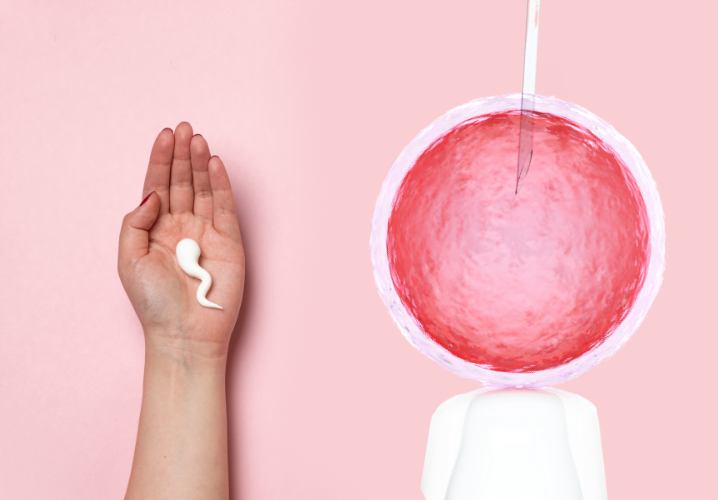IVF with Donor Sperm

In vitro fertilization (IVF) with donor sperm has become an increasingly popular option for individuals and couples seeking to overcome fertility challenges. Whether due to male infertility, single parenthood, or same-sex couples looking to start a family, using donor sperm in IVF offers a viable path to parenthood.
In this article, we’ll explore the reasons for using donor sperm, the process, and emotional and financial considerations, including overall health and potential alternative treatments.
Why you might need IVF with donor sperm
There are various reasons people turn to IVF with donor sperm to grow their families. These generally include
- Heterosexual couples with severe male factor infertility combined with female fertility issues
- Female couples
- Single females wanting to become single mothers by choice
Heterosexual Couples
Male factor infertility plays a role in upwards of 50% of couples struggling with infertility. However, many men in this category are still eligible for less invasive treatments like intrauterine insemination (IUI), and IVF using their own sperm.
Treatment options become limited when a man has a form of severe male factor infertility called azoospermia, in which zero sperm are present in the ejaculate. Azoospermia is identified in approximately 1% of all men and 10 to 15% of those with male factor infertility.
Those with azoospermia and female fertility are confined to the following treatment options:
- Sperm extraction with IVF – sperm can be present in the testicle even when not present in the ejaculate.
- IUI with donor sperm. In this case the sperm will either be from a known donor or an anonymous donor obtained from a sperm bank.
- IVF with donor sperm. Either from a known donor or an anonymous donor from a sperm bank.
The more severe the male and female fertility issues, the more likely donor sperm with IVF is needed.
Female Couples
Female-only couples will always need donor sperm to conceive. Whether or not they also need IVF or can settle for less invasive treatments like IUIs or home inseminations depends on the presence of other fertility issues such as age, Anti-Müllerian Hormone (AMH) levels, egg quality, fallopian tube damage, or endometriosis.
If one or both parties have fertility issues, it is likely they will need IVF with donor sperm to conceive.
Single Females
Similar to female couples, single females with their own fertility issues will likely benefit from IVF with donor sperm. Of note, you can also use less invasive options such as IUI if you have open fallopian tubes.
Sex/Gender Selection
Regardless of your sexual orientation or relationship status, those who have no sperm can select sex/gender with fertility treatments such as IUI or IVF with donor sperm.
How does IVF with donor sperm work?
IVF with donor sperm is similar to the IVF process when using your own or your partner’s sperm—with some minor differences.
During IVF, a number of eggs are removed from the woman’s ovaries after about 9-12 days of hormonal medications.
The mature eggs are then fertilized with sperm in the embryology lab. This can be done by either putting the sperm and eggs together in a petri dish (also known as conventional IVF), or, as is usually done at CNY, your embryologist will perform a procedure known as intracytoplasmic sperm injection (ICSI), injecting sperm right into each egg.
With donor sperm IVF, the sperm used to fertilize the eggs will come from either a known donor or an anonymous donor from a sperm bank
After fertilization, the resulting embryos will be grown in the embryology lab for 3-7 days before being transferred to the female partner’s uterus or frozen for a future frozen embryo transfer (FET).
Should you choose to do a fresh embryo transfer, any remaining embryos may be frozen for later use.
Where do I find donor sperm?
There are generally two places to find sperm donors: Friends/family (known donors) and sperm banks (anonymous donors).
Friends and Family: “Known” sperm donors
Known sperm donors are donors you personally know. They might be a family member, friend, or acquaintance. When working with a known donor, it is a good idea to work with a reproductive lawyer to work out agreements between intended parents and the sperm donor.
Donors through sperm banks
There are two types of donors you can find through a sperm bank.
- Anonymous sperm donors: You can access general information such as race, appearance, and educational background, but you won’t know the donor’s identifying information.
- Open sperm donors: An open donor has agreed to share their identification with you and any potential children. You may meet the donor and share information about any future children. You may meet the donor and share information about any future children.
Sperm from sperm banks are required to go through rigorous testing by the FDA for diseases. The American Society for Reproductive Medicine (ASRM) provides guidelines for donor sperm testing in addition to the FDA guidelines. These include screening for genetic disorders, gathering a family history, and providing psychotherapy for donors and recipients.
At CNY Fertility, we work with many sperm banks, including:
The sperm banks CNY contracts with can help walk you through the process of finding a donor. From there, you can set up your account and purchase as many vials of sperm as you need. It is important to be sure that your fertility clinic of choice has any donor sperm you plan on using prior to the start of your treatment cycle.
What type of donor sperm is used for IVF?
Donor sperm comes in a number of different grades or preparations when purchasing from a bank.
- ICI Vials: This sperm is unwashed, meaning it is unprocessed and still mixed with seminal fluid.
- IUI Vials: This sperm has been washed (separated from seminal fluid) and is concentrated.
- ART/IVF/ICSI Vials: These vials may be washed or unwashed but generally have fewer total motile sperm.
All vial types are usually suitable for IVF, but since ICI and ART vials generally contain fewer motile sperm, they are usually less expensive and are a preferred option for many people pursuing IVF with donor sperm.
It is also important to know that sperm banks may have different names for their sperm types, so it is important to consult with them and your provider before purchasing any donor sperm.
How much does IVF with donor sperm cost?
The cost of donor sperm IVF depends on the sperm bank, the type of sperm, your fertility clinic, and your treatment protocol.
Depending on the bank and vial type, donor sperm generally costs between $400 and $2,000 a vial.
This price doesn’t include the actual cost of IVF, which averages around $19,200 in the U.S.
Compared to the national average, CNY Fertility provides IVF for one-third of the national average cost, at $5,769, including medications. Keep in mind that you may need more than one vial of sperm and more than one IVF cycle if your first attempt at pregnancy isn’t successful.
IVF donor sperm success rates
Success rates for donor sperm IVF range widely depending on many factors, including the age of the person with ovaries, egg quality, the donor sperm, the fertility clinic, and the overall health of the person carrying the pregnancy, among other factors. In general, studies show success rates typically range from 40-80%.
Research has found that women in same-sex female relationships experiencing infertility have similar IVF pregnancy success rates as others experiencing infertility.
Other studies have found that overall, women in same-sex female relationships have higher overall success rates of pregnancy with IVF, likely because they may not have any underlying fertility issues.
If you decide to do IVF using donor sperm, CNY Fertility can walk you through the process and provide a personalized plan that’s right for you. Schedule a consultation today!



